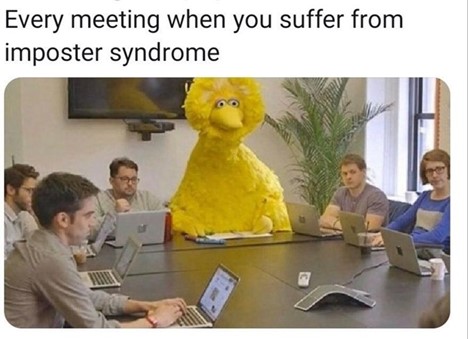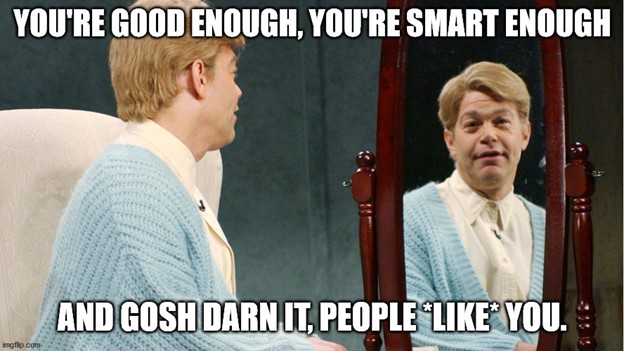Imposter syndrome is a term that’s been thrown around a lot lately. For a job seeker, it’s that irrational-but-nagging feeling you’re not good enough or smart enough, and it can destroy your ability to make a good impression in a job interview. It may even stop you from applying in the first place, even if you seem to be a good fit for the job.
“Imposter syndrome is the natural, normal brain’s response to a specific belief about your worth;
The (false) belief that your worth is conditional (i.e., your worth depends on what you do),” writes Tara Halliday, an imposter syndrome specialist (yes, that’s a thing) and author of Unmasking, the Coach’s Guide to Imposter Syndrome. “[It’s] like a heavy weight that drags you down, exhausts you and holds you back in your career.”
It’s estimated that up to 82% of people suffer from imposter syndrome, yet the topic is sensitive. When we asked for feedback to help with this article among professionals we knew, we were met with unusual silence. What gives? Perhaps it’s the nature of imposter syndrome that keeps those who suffer from it (which, it turns out, is MOST of us) silent. But since it can quickly derail your job search, especially if you’re leveling up in your career, we wanted to blow the subject wide open with helpful tips and advice.

What Imposter Syndrome Isn’t
There are plenty of misconceptions around imposter syndrome. Shattering these myths can be the first step in overcoming it yourself. Keep in mind, then:
- It doesn’t skip over high achievers. You may feel that everyone above your pay grade has all the confidence in the world, but Halliday asserts that 70% of high achievers who enjoy impressive levels of outside success suffer from imposter syndrome. In fact, as the New York Times reports, imposter syndrome may not even kick in for some people until they reach a high level of success.
- It’s doesn’t just affect women and minorities. Women were at the center of the original study that coined the term, and women and other minorities have since been the primary focus of “advice” for those suffering from imposter syndrome. But treating it as a minority issue discounts people of all walks of life who suffer from the phenomenon.
- There’s not just one definition. Several experts have put together different subgroups of imposter syndrome to show that there’s not just one type out there. Dr. Valerie Young, for instance, defines five types: perfectionists, experts, supermen/superwomen, natural geniuses, and soloists. Check out her definitions of these types here.
FIND YOUR NEXT OPPORTUNITY WITH THE HT GROUP
Ready to move your career forward? Connect with The HT Group today!
Why It’s Critical To Address
So you need more confidence. Isn’t humbleness a virtue? Discounting imposter syndrome like this can hold significant consequences. You could lose out on your dream job or remain chronically underpaid and undervalued. It could also affect your health.
Heather Rider, an Austin anxiety expert and imposter syndrome coach, says that imposter syndrome often goes hand-in-hand with high-functioning anxiety, which can lead to health issues. For her, it manifested as a severe autoimmune reaction while working in the Austin tech field.
“My nervous system was shot, and my body just gave out,” she told Authority Magazine. “When I suffered from imposter syndrome, I felt like I was in a movie, but it was my life. I remember thinking that ‘I can’t do this’ while I was at work. It didn’t make any sense. It felt like I was faking it, but I wasn’t. I was actually doing real, quality work.”

Steps To Combat It
Haley Snider, a brand strategist at Austin’s Zilker Media, works daily with authors and other thought leaders battling imposter syndrome. She recently shared tips on what she’s seen work among even the highest achieving individuals. The first step? Stop dismissing your accomplishments and start celebrating them. The process goes deeper than mere daily affirmations Stuart-Smalley style…but that’s a start.
“This could…be a simple shift in the way you think after hitting a big personal goal: Instead of, ‘That was just pure luck’ try taking a moment to think about each of the steps you took to hit that goal and provide the evidence your mind might need,” she recommends. Check out her additional tips here.
Rider also outlines several steps to take to overcome imposter syndrome here. One step Rider recommends is confiding in people you trust—either at work or someone you admire. A recruiter can serve as a great sounding board in this way.
“It’s in both your best interests for your recruiter to help build you up and also to be honest with you about areas you may need to improve,” says Dave Benjamin, Practice Director-Professional Services at The HT Group. “A reputable recruiter will be transparent with you about your strengths and, when they do, believe them. Don’t discount it as flattery. At the end of the day, we work for the employer, which means we pair them with job candidates we truly believe can do the job.”




